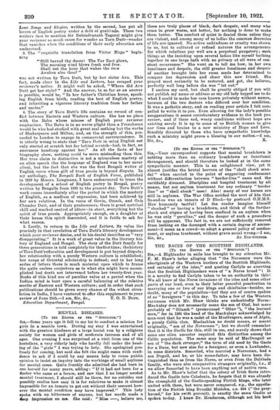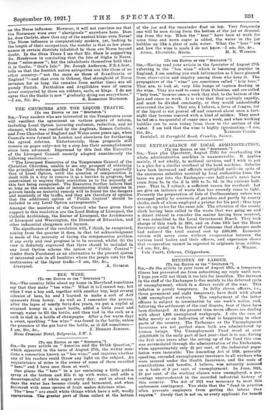THE RACES OF THE SCOTTISH HIGHLANDS. [To THE EDITOR Or
THE " SPECTATOR."] Sts, —A Highlander in exile has brought to my attention Mr. F. M. Shaw's letter alleging that " the Norsemen were the aboriginals of the Western borders of the Scottish Highlands, and certainly of the isles," and quoting Carlyle as asserting that the Scottish Highlanders were of " a Norse breed "1 It is a novelty to find Carlyle taken to be an authority in this! We all know of the Norse invasions of the islets and some other parts of our land, even to their latter peaceful penetration in marrying one or two of our kings and chieftains—besides, no doubt, many of the population—but they are of course spoken of as " foreigners " to this day. To take a few of the Western surnames which Mr. Shaw thinks are undoubtedly Norse: MacAulay does not necessarily mean the son of Olaf, but more probably of "011amh " (pronounced " 011uv "), " the learned man," for in 1591 the head of the MacAulays acknowledged by man-rent that he was a cadet of the MacGregora, eons of Alpin, a purely Celtic clan. Maclachlan no doubt means, or meant originally, " son of the Norseman"; but we should remember that it is the Gaelic for this, still in use, and merely shows that some one alien ancestor required this distinction among the Celtic population. The same may be said of MacDougall as son of " the dark stranger," the term of old used by the Gaels for a Dane, but now also for a foreigner, or even a Lowlander, in some districts. Somerled, who married a Norseman, had a son Dugall, and he, or his name-father, may have been dis- tinguished thus as from the Norse, or even from the Dalriada family, who were also comparative strangers originally, i.e., if we allow Somerled to have been anything not of native race.
As to Mr. Shaw's belief that the colony of Irish Scots intro- duced the Gaelic into Caledonia, he forgets that it was already the stronghold of the Gaelic-speaking Pictish kings, who later united with them, but were never conquered, e.g., the appella- tion of the Pictish king Bruidhi Mialchu, A.D. 554 (" the grey- hound," for his swift pursuit), is exactly the same Gaelic as spoken to-day. I knew Dr. Henderson, although not his book
on the Norse influence. However, it will not convince me that the Norsemen were ever " aboriginals" anywhere here. Does be, does Carlyle, show that any of the ancient kings were Norse? The Norse influence is comparatively modern, yet, looking to the length of their occupations, the wonder is that so few place- names in certain districts inhabited by them are Norse beyond doubt. In the Oban Times I see that Mr. Shaw is supporting Dr. Henderson in concluding that the Isle of Gigha is Norse, from "solan-goose"; but the inhabitants themselves hold that it is Gaelic, " God's Isle." Dr. Joseph Anderson, F.S.A.Scot., tells us that the Scottish native antiquities are like those of no other country—" not the same as those of Scandinavia or England "—and that even in Orkney, that stronghold of Norse invasion for so long, the remains from earlier times are all purely Pictish. Perthshire and Argyllshire were of course never conquered by these sea robbers, earls, or kings. I do not agree that the Gaelic is now " gradually dying out everywhere."



































 Previous page
Previous page